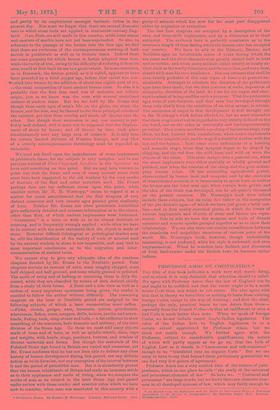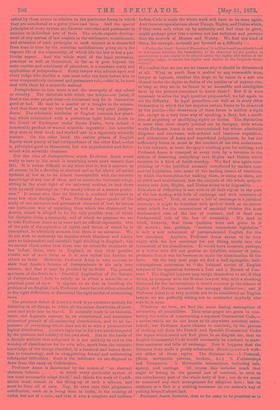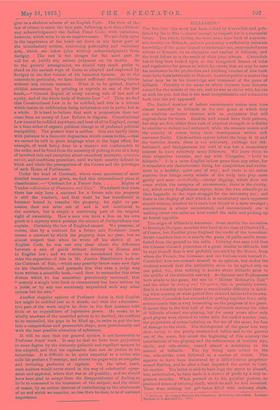PROFESSOR AMOS ON CODIFICATION.*
Tux title of this book indicates a work very well worth doing, and to which it is very desirable that attention should Le called. IVe agree with Professor Amos that the law of England can be and ought to be codified, and that the result ought to be a much better Code than any which as yet exists. We also agree with him that in theory we have little or nothing to learn from existing foreign Codes, except in the way of warning ; and that the chief, perhaps the only, practical lesson we can derive from them— especially from the French Codes—is that an indifferent or even a bad Code is much better than none. When we speak of foreign Codes, we do not include recent Anglo-Indian legislation. The value of the Indian Acts to English legislators is to a certain extent appreciated by Professor Amos, but we think not nearly enough. We further agree with the Professor, subject to considerable qualifications, the nature of which will partly appear as we go on, that the bulk of English Law as it stands is "harmonious and self-consistent" enough to be "translated into an organic Code." But we are sorry to have to say that beyond these preliminary generalities we can find very few points of agreement.
Professor Amos has a very exalted idea of the science of juris- prudence, which in one place he calls "the study of the universal and permanent elements of law." So have we. " Universal and permanent" are large words, but no doubt there are elements com- mon to all developed systems of law, which may fairly enough be called by those names in relation to the particular forms in which they are manifested at a given place and time. And the special principles of every system are likewise universal and permanent in relation to individual sets of facts. The whole organic develop- ment of any system of law consists in the settlement, resettlement, and extension of such principles in such manner as is demanded from time to time by the ceaseless modifications going on in the organic life of the community, of which life the law is but a par- ticular aspect. And the whole work of the legal profession, practical as well as theoretical, so far as it goes beyond the mere routine and machinery of procedure, is a constant study and application of jurisprudence. Every lawyer who advises upon and every judge who decides a case must refer the facts before him to some comparatively universal and permanent rule,—that is, he must deal with them by a scientific method.
Jurisprudence in this sense is not the monopoly of any school or country. The materials with which the lawyer—or jurist, if that is the more proper term—is concerned may be in themselves
good or bad. He may be a master or a bungler in the science. And thus there may be very bad as well as very good jurispru-
dence. The scholastic subtleties of English common-law plead- ing, which culminated with a portentous light before death in the Court of Exchequer under Baron Parke, were indeed a lamentable product of wasted scientific ingenuity ; but scientific they were in their kind, and worked out in a rigorously scientific manner. On the other hand, the earlier phases of English Equity show plenty of bad jurisprudence of the other kind,—that is, principles good in themselves, but not apprehended and deter- mined with scientific clearness.
But the idea of Jurisprudence which Professor Amos seems really to have in his mind is something much more esoteric than this. It is rather difficult to say what that is, but it appears, at all events, to be a doctrine so abstract and so far above all actual systems of law as to be almost incompatible with the concrete knowledge of any one of them, and to enable the fortunate adept, sitting in the clear light of his universal notions, to look down with no small contempt on "the murky offices of a narrow profes- sion." It seems also that it fruition is confined at present to some few elect disciples. When Professor Amos speaks of the study of the universal and permanent elements of law, he means one particular way of regarding them which was discovered by Austin, which is alleged to be the only possible way, of which his disciples claim a monopoly, and of which we presume we are to take Professor Amos as in some sort an official expounder. Out of the pale of the mysteries of rights and duties of which he is hierophant, he obviously assumes that there is no salvation. We do not wish to underrate the impulse which Bentham and Austin gave to independent and scientific legal thinking in England ; but we cannot think either that there was no scientific treatment of law before them, even in England, or that their positive results are of such value as it is now rather the fashion to attach to them. However, Professor Amos is very anxious to show that Austin's Science of Jurisprudence is the only true science, and that it may be justified by its fruits. The present specimen of the fruits in a "Practical Application of the Science of Jurisprudence " fails to satisfy us in either a scientific or a practical point of view. it appears to us that in handling the problem of an English Code Professor Amos has not either attended to the right difficulties or discovered the right modes of overcoming them.
The principal defect of Austin's work is an excessive anxiety for definition in all things, to which all the minor drawbacks of treat- ment and style may be traced. It naturally leads to an inelastic, harsh, and dogmatic manner, to an overstrained and sometimes chimerical pursuit of all-embracing classification, and to an im- patience of everything which does not fit in with a preconceived logical distribution. Austin's logic was in his own hands tempered by the patience and solidity of his own work. But in the hands of a disciple without that safeguard it is not unlikely to end in the worship of classification for its own sake, apart from the accurate knowledge of the things classified, in a fanatical and barren devo- tion to terminology, and in exaggerating formal and underrating substantial difficulties. Such is the inference we are disposed to draw from this essay on Codification.
Professor Amos is dominated by the notion of "an abstract skeleton Scheme to which every particular system of law must necessarily adapt itself," and thinks the work of Codifi-
cation must consist in the filling-up of such a scheme, and must be done all at once. Nay, he even says that progressive
codification, such as is being done in India, is the making of codes, but not of a code, and that if ever a complete and uniform Indian Code is made the whole work will have to be done again.
And there are speculations about Things, Rights, and Duties which, if they were only taken up by authority and had time to grow, might perhaps grow into a system not less technical and perverse than the marvels of Meeson and Welsby. We find this kind of thing, for example, seriously put forward as a difficulty :—
"Under the head Laws of Procedure,' it will be found peculiarly hard • to determine whether the formalities to be observed by the parties ia prosecuting a suit ought to be placed under the rights and duties of the presiding judge, or under the rights and duties of the litigants them- selves."
We confess that we can see no reason why it should be determined at all. What on earth does it matter to any reasonable man, lawyer or layman, whether the steps to be taken in a suit are classed under the rights or duties of the parties or of anyone else, so long as they are to be found in an accessible and intelligible- form by the persons concerned to know them? But if it were- necessary to solve the high question propounded, we fail again to'
see the difficulty. In legal procedure—as well as in every other transaction in which the law requires certain forms to be observed, by the parties—the observance of those forms is neither a right
nor, except in a very loose way of speaking, a duty, but a condi- tion of acquiring or modifying rights or duties. The distinction is more than once clearly pointed out by Savigny, with whose works Professor Amos is not unacquainted, but whose admirable diligence and exactness, well-ordered and luminous exposition, and abhorrence of hasty and superficial judgments, he has not sufficiently borne in mind in the conduct of his own endeavours._ In this instance, at least, Savigny's teaching goes for nothing, and Professor Amos is cramped at every turn by a devotion to the system of dissecting everything into Rights and Duties which amounts to a kind of fetish-worship. We find him again com- plaining of "the juridical anomaly introduced by modern com- mercial legislation into some of the leading classes of contracts,
by which the formalities for making them, or suing on them, are- so strict and multifarious, that the analysis of the whole subject- matter into Acts, Rights, and Duties seems to be impossible. . . This class of difficulties is met with in all their rigour in the part of the law dealing-with bills of exchange and with contracts of affreightment." Well, of course a bill of exchange is a juridical
anomaly ; it might be described with perfect truth as an instru- ment which for the convenience of mankind violates the most fundamental rule of the law of contract, and at least one- fundamental rule of the law of ownership. We used to. think, however, that these qualities were not given to it by statute ; but, perhaps, "modern commercial legislation' is only a new refinement of jurisprudential English for the law merchant. Anyhow, Professor Amos seems to be very angry with the law merchant for not fitting nicely into the framework of his classification. It would have occurred, perhaps, to a writer who did not profess an infallible science of juris- prudence that it was his business to make the classification fit the facts. On the very next page we find a half-apologetic, half- contemptuous concession to "the habitual notion of English lawyers of the opposition between a Tort and a Breach of Con- tract." The English lawyers may resign themselves to err, if they do err, in company with the Roman lawyers, who, with a shocking disregard for the inconvenience it would occasion to the scheme of Rights and Duties, invented the unhappy distinction ; and if Professor Amos is so very anxious not to be considered an English lawyer, we are perfectly willing not to contradict anybody who says he is none.
Wherever we turn, we find the same daring assumption of exhausting all possibilities. Thus some pages are given to com- bating the notion of constructing a separate Commercial Code,— a notion which we do not know to be anywhere seriously enter- tained; but Professor Amos chooses to conclude, by the process. ofstriking out from the French and Spanish Commercial Codes the topics which could not find place in an English one, that an English Commercial Code would necessarily be confined to mari- time contracts and bills of exchange. Now it happens that the
Germans have made a pretty substantial Handelsgesetzbuch with- out either of these topics. The divisions are: —1. Personal,
(firms, mercantile persons, brokers, &c.) 2. Partnerships and Companies. 3. Mercantile transactions, including sale, agency, and carriage. Of course this includes much that
ought to belong to the general law of contract, or even to the introductory part of the whole body of law ; nor do we mean to commend any such arrangement for adoption here ; but its
existence as a fact is a striking comment on our author's way of putting himself above fact.
Professor Amos, however, does so far essay to be practical as to
give us a skeleton scheme of an English Code. The view of the law of crimes is much the best part, following as it does (without any acknowledgment) the Indian Penal Code, with variations, however, which seem to us no improvements. We also fully agree in the importance of the heads set down in the latter part of the introductory section, concerning personality and voluntary acts, which are taken (also without acknowledgment) from Savigny. The rest is too meagre for the most part to call for or justify any serious judgment on its merits. As to the general arrangement, we should very much prefer to stand on the ancient ways of Gains as adopted and improved by Savigny in the first volume of his immortal System. As to the contents in particular, we have found sufficient stumbling-blocks without any curious research. What is to be gained, beyond childish amusement, by printing in capitals as one of the first lieads,—" General Repeal of every exiating rule of law and of equity, and of the whole body of Statute Law "—? Then we find that Constitutional Law is to be codified, and this in a scheme which insists on codification being undertaken not in parts, but as a whole. It is hard to believe that such a proposition does not come from an enemy of Law Reform in disguise. Constitutional Law cannot be codified anywhere, and least of all in England, except in a time either of organic political change or of profound political tranquillity. The present time is neither. One can hardly listen with patience to a theoretic dogmatism which comes to this,—that we cannot be told in plain language what is the legal effect, for -example, of work being done in a manner not conformable to the order, and be freed from the necessity of picking it out of a heap of involved rule and exception about executory contracts, quantum aneruit, and conditions precedent, until we have exactly defined in black and white the prerogatives of the Crown and the privileges of each House of Parliament.
Under the head of Contract, where some specimens of more detailed treatment are given, we find this extraordinary piece of
classification :—" Contract for a Future Sale Rights of Vendor—Retention of Possession and Lien." We submit that when there has only been a contract for a future sale the property is still the vendor's, and that until he has transferred or becomes bound to transfer the property, his right to pos- session does not arise out of and is not incidental to the contract, but is simply a continuing part of his original right of ownership. How a man can have a lien on his own goods is a mystery which perhaps the science of Jurisprudence can explain. Certainly the law of England cannot. We presume, of course, that by a contract for a future sale Professor Amos means a contract by which the property does not pass ; but we almost suspect that when he wrote off his sketch of an English Code he was not very clear about the difference between a sale of goods without delivery in Roman and in English law ; and we venture to recommend him to con- sider the exposition of this in Mr. Justice Blackburn's work on the Contract of Sale,—which may possibly throw some new light on his classification, and persuade him that even a judge may bave written a scientific book,—and then to reconsider this other dictum which be has somewhat gratuitously enounced, that
scarcely a single text-book or commentary has been written by -a jurist, or by any one accurately acquainted with any other system but his own."
Another singular opinion of Professor Amos is, that English law might be codified just as it stands, and that the administra- tive part of the work might be done in the firat instance with little or no expenditure of legislative power. He seems to be wholly unaware of the unsettled points to be decided, the conflicts to be reconciled, the gaps to be filled up, in order to put the law into a compendious and presentable shape, even provisionally and with the least possible alteration of substance.
It will be seen that our general opinion is not favourable to Professor Amos' work. It may be that we have been prejudiced in some degree by the curiously pedantic and repellent manner he has adopted, and that his expression does not do justice to his intentions. It is difficult to be quite impartial to a writer who calls his preface a Prmacript, and strews his pages with an irregular .and irritating profusion of capitals. On the other hand, such matters would never stand in the way of substantial agree- ment and approval, where that was at all possible; and we should have been glad to escape from the disappointment of finding so little to commend in the treatment of the subject, and the choice of means, by an author desirous of contributing to the attainment of an end which we consider, no less than he does, to be of eminent importance.




































 Previous page
Previous page